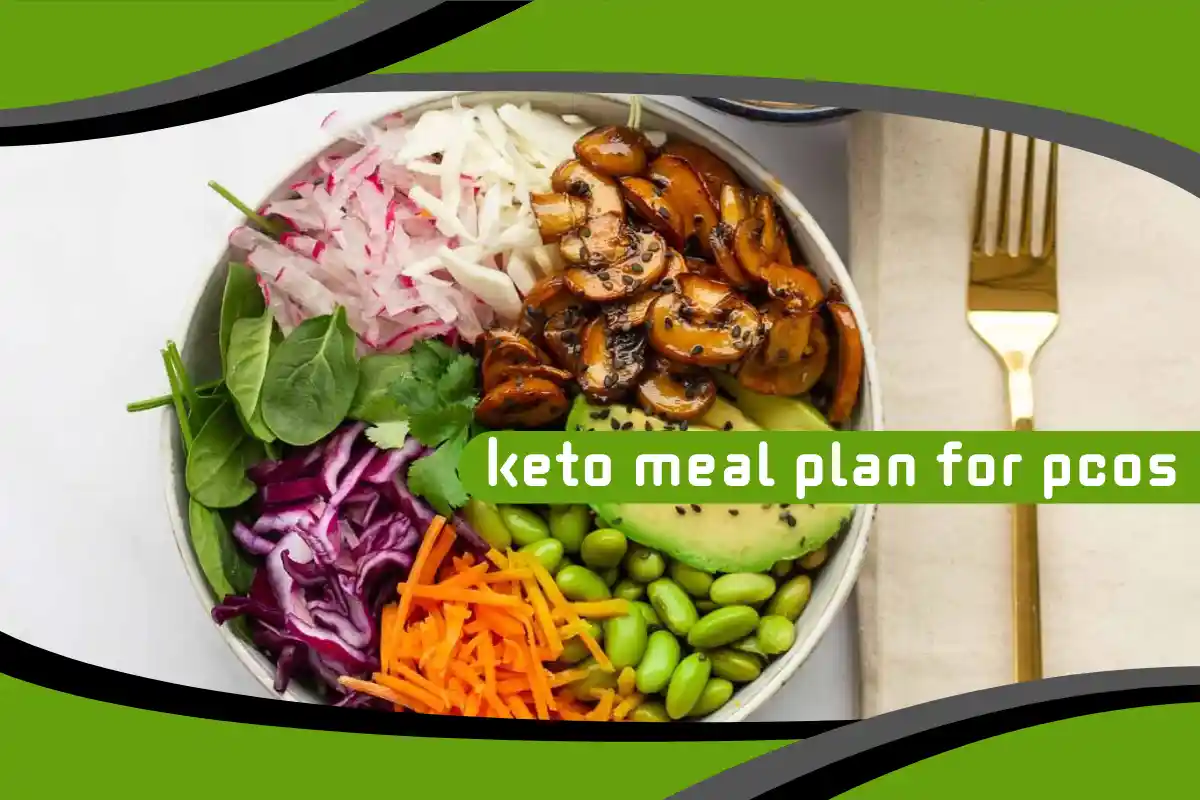Polycystic Ovary Syndrome (PCOS) is a complex hormonal disorder that affects millions of women worldwide, often causing irregular menstrual cycles, insulin resistance, weight gain, and fertility challenges. Nutrition plays a critical role in managing PCOS symptoms, and among the most promising dietary strategies is the ketogenic diet. By focusing on high-fat, low-carbohydrate foods, the keto meal plan helps regulate insulin levels, reduce inflammation, and support weight loss. This article explores how to build an effective keto meal plan tailored for women with PCOS, highlighting foods, meal timing, and lifestyle factors that enhance hormonal balance.

Understanding the Link Between PCOS and Insulin Resistance
One of the central features of PCOS is insulin resistance, where the body struggles to use insulin effectively. This condition not only increases the risk of type 2 diabetes but also contributes to excess androgen production, leading to symptoms like acne, hirsutism, and menstrual irregularities. A ketogenic diet can significantly reduce insulin levels by minimizing carbohydrate intake, thereby addressing a root cause of PCOS. Lower insulin levels often translate to improved hormonal profiles and more regular ovulation in women with PCOS.
How the Keto Diet Supports Hormonal Balance
The ketogenic diet emphasizes a high intake of healthy fats, moderate protein, and very low carbohydrates. This macronutrient distribution forces the body into a metabolic state known as ketosis, where it burns fat for energy instead of glucose. For women with PCOS, this shift is particularly beneficial because it leads to more stable blood sugar levels and lower insulin secretion. These hormonal improvements can enhance fertility, reduce androgen excess, and support a more balanced endocrine system.
Crafting a Sustainable Keto Meal Plan for PCOS
When creating a keto meal plan for PCOS, it’s essential to focus on nutrient-dense, anti-inflammatory foods. A successful plan includes whole foods such as leafy greens, fatty fish, avocados, nuts, seeds, and high-quality meats. It’s important to avoid overly processed keto products that may contain additives or artificial sweeteners, which can disrupt hormones. Meal planning should also consider ease of preparation, personal preferences, and the need for long-term adherence to maintain consistent results.
Choosing the Right Fats for Hormonal Health
Healthy fats are the cornerstone of a keto diet, especially for managing PCOS. Monounsaturated fats found in avocados, olive oil, and macadamia nuts help reduce inflammation and improve insulin sensitivity. Omega-3 fatty acids from fatty fish like salmon and sardines are also critical, as they support ovarian function and reduce androgen levels. Saturated fats from coconut oil and grass-fed butter can be included in moderation, but trans fats and hydrogenated oils should be strictly avoided to protect hormonal integrity.
Watch also: Keto Meal Plan for Weight Loss: A Comprehensive Expert Guide to Fat-Burning Nutrition
Protein Sources That Support Satiety and Muscle Mass
Protein plays a vital role in a PCOS-friendly keto diet, supporting muscle maintenance, satiety, and metabolic health. Women with PCOS should prioritize clean protein sources such as grass-fed beef, free-range poultry, wild-caught fish, and organic eggs. These foods help stabilize blood sugar and reduce cravings. Plant-based keto proteins like tofu, tempeh, and hemp seeds can also be included, particularly for those following a vegetarian or flexitarian approach.
Low-Carb Vegetables to Maximize Nutrient Density
Vegetables are crucial in any diet, including keto, especially for PCOS management. Non-starchy vegetables like spinach, kale, cauliflower, broccoli, zucchini, and bell peppers are low in carbohydrates but high in fiber, vitamins, and antioxidants. These nutrients help combat inflammation and oxidative stress, both of which are common in women with PCOS. Including a wide variety of colorful vegetables in each meal ensures optimal micronutrient intake and promotes digestive health.
Importance of Fiber in a Keto PCOS Diet
While traditional keto diets are often low in fiber, it’s vital for women with PCOS to incorporate fiber-rich foods to support digestion, hormone detoxification, and blood sugar control. Foods like chia seeds, flaxseeds, leafy greens, and avocado provide ample fiber while keeping carbs low. Adequate fiber also feeds beneficial gut bacteria, which influences estrogen metabolism and overall hormonal balance. A thoughtful inclusion of fiber helps prevent common issues like constipation and bloating on keto.
Avoiding High-Glycemic and Processed Carbohydrates
Eliminating refined carbs is essential for managing PCOS through keto. High-glycemic foods like white bread, pastries, sugary snacks, and sweetened beverages spike insulin and promote fat storage, particularly around the abdomen. Women with PCOS are especially sensitive to these insulin surges. Instead, keto-approved carbohydrates should come from nutrient-dense, low-glycemic sources like berries, cruciferous vegetables, and limited portions of nuts and seeds.
Meal Timing and Intermittent Fasting for PCOS
Meal timing can play a significant role in hormonal regulation. Many women with PCOS find success incorporating intermittent fasting (IF) alongside a keto diet. IF can help improve insulin sensitivity, reduce inflammation, and support weight loss. A common method involves fasting for 14–16 hours overnight and consuming all meals within an 8–10 hour window. However, fasting should be approached cautiously and personalized to each woman’s stress levels and menstrual cycle patterns.
Hydration and Electrolyte Balance on Keto
Staying hydrated is vital, especially when beginning a keto diet. The body excretes more water and electrolytes as it adapts to burning fat, which can lead to fatigue, cramps, and brain fog—symptoms often called the “keto flu.” Women with PCOS should prioritize electrolyte-rich foods like spinach, avocado, bone broth, and sea salt. Supplementing with magnesium, potassium, and sodium may also help maintain fluid balance and support hormone regulation.
Managing Sugar Cravings with Keto Snacks
Women with PCOS often experience intense sugar cravings due to insulin dysregulation. Keto-friendly snacks can help ease the transition and keep cravings in check. Options include hard-boiled eggs, nut butter on celery, keto fat bombs made with coconut oil, or full-fat Greek yogurt with a few berries. Having prepared snacks on hand reduces the risk of reaching for high-carb options and helps maintain consistent energy levels throughout the day.
Watch also: Keto Meal Plan for Vegetarians: The Ultimate Guide to Low-Carb Plant-Based Eating
Role of Inflammation in PCOS and How Keto Helps
Chronic inflammation is a contributing factor in PCOS, often exacerbating insulin resistance and hormonal imbalances. The keto diet’s anti-inflammatory effect stems from its elimination of sugar, processed foods, and seed oils. Additionally, foods rich in antioxidants—such as leafy greens, turmeric, and wild-caught fish—can further reduce inflammatory markers. Lower inflammation improves ovarian function, skin health, and overall metabolic outcomes in PCOS.
Importance of Micronutrients for Reproductive Health
Women with PCOS are often deficient in key micronutrients such as vitamin D, magnesium, zinc, and B vitamins. A well-formulated keto plan should prioritize these nutrients through both food and supplementation if needed. Vitamin D supports ovulation, magnesium improves insulin sensitivity, and zinc plays a role in androgen balance. Including a variety of whole foods ensures that these critical nutrients are consistently part of the daily intake.
Building Balanced Keto Meals for Blood Sugar Control
Each keto meal should be carefully balanced to provide steady energy and minimize insulin spikes. A plate might include grilled salmon (protein and fat), a large portion of sautéed kale in olive oil (fiber and micronutrients), and avocado slices (healthy fat and potassium). Balancing macronutrients at every meal helps stabilize mood, reduce cravings, and maintain hormonal harmony throughout the day.
Meal Prep Strategies for Long-Term Success
Meal prepping makes it easier to stay on track with a keto diet for PCOS. Planning meals in advance reduces the temptation to make poor food choices and ensures nutrient-dense options are always available. Batch-cooking proteins, pre-chopping vegetables, and portioning out snacks can streamline your week and reduce stress. Consistency is key in achieving hormonal improvements, and structured meal prep supports long-term adherence.
Keto and Exercise: Supporting Metabolic Flexibility
Physical activity enhances the benefits of a keto diet in PCOS by improving insulin sensitivity and promoting fat loss. Combining resistance training with moderate cardio can enhance metabolic flexibility and hormone regulation. Women should focus on movement they enjoy to reduce cortisol, which can otherwise disrupt hormonal balance. Fueling workouts with keto meals ensures steady energy without blood sugar crashes.
Monitoring Progress and Adjusting the Plan
Regularly tracking symptoms, weight changes, menstrual cycles, and energy levels helps assess the effectiveness of a keto plan for PCOS. Adjustments may be necessary based on progress, and working with a registered dietitian or healthcare provider ensures personalized support. Some women may need to cycle carbs occasionally, while others thrive on a more strict approach. Bioindividuality is key in long-term success.
Common Pitfalls to Avoid on a PCOS Keto Diet
Despite its benefits, some women make mistakes when starting keto—such as eating too little fiber, not drinking enough water, or relying on processed keto snacks. Avoiding these pitfalls requires education and preparation. Choosing whole, nourishing foods and focusing on lifestyle factors like sleep and stress management will greatly enhance results and reduce the risk of burnout or nutrient imbalances.
Final Thoughts on Keto for PCOS Management
A ketogenic meal plan, when thoughtfully designed, offers powerful benefits for women managing PCOS. From improving insulin sensitivity to supporting hormonal balance and reducing inflammation, keto provides a strategic nutritional framework. Pairing keto with exercise, stress reduction, and adequate sleep creates a comprehensive approach to PCOS that empowers women to reclaim their health, fertility, and vitality.
Watch also: Keto Meal Plan for Type 2 Diabetes: A Complete Guide to Blood Sugar Control and Weight Loss



No comment